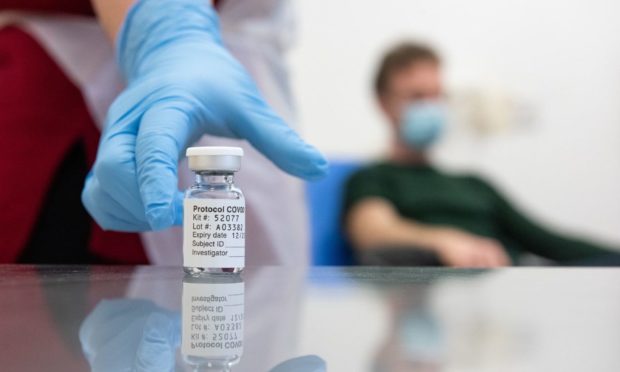Let’s start with a question: Do we really want to see the end of Covid, which has imposed house arrest on virtually the entire nation for more than a year?
It should be rhetorical, but given the near-hysteria surrounding the AstraZeneca vaccine, and the vehement opposition to the prospect of some kind of vaccine passport, I’m not so sure.
For a country that has suffered more than the vast majority of others from the ravages of coronavirus, the commendable efficiency with which vaccination has been delivered across the UK has provided the only real light at the end of what has been a very, very long tunnel.
The AstraZeneca jag, developed by a team from Oxford University, has been the vaccine of choice at most of the centres which have sprung up right across the UK, favoured for a variety of reasons, including its availability, price and easy storage. It is a real success story at a time when we were crying out for one.
Yet, what do we do? We resort to the old British tradition of knocking anything that’s good. It appears we can’t stand success and are happy only when we’re destroying everything we’ve built; we need to be miserable; our glass can’t be half full, it must be completely empty.
I’m not just talking about the so-called Covid deniers here, but all those who are questioning the safety of the AstraZeneca jag based on a tiny number of people who have suffered blood clots after having received their jag.
True, most of the hysteria is rooted elsewhere in the world, with Germany, France, the Netherlands and Canada restricting the use of the AZ vaccine to older people. But this illogical reaction, put in place without a shred of firm proof, has created alarm here in the UK, with an increasing number of people now reluctant to be vaccinated in case they too develop blood clots.
All health organisations in this country, supported by the European Medicines Agency, insist the vaccination is safe and that the risks of not taking it are substantially higher. For those who will adopt the “they would say that, wouldn’t they” approach, let’s look at the facts.
As of March 24, the last date for which figures are available, a total of 18 million people in the UK had been vaccinated, of which 30 had developed the cerebral venous sinus thrombosis (CVST), which is the type of brain haemorrhage causing concern.
Of those, seven people had died, a mortality rate of approximately one in 2.5 million. Based on current data, if 2.5 million 40-year-old people contracted Covid, an estimated 2,500 of them would die. That equates to a mortality rate of one in every 1,000. It really should be a no-brainer.
Further, those figures assume that the vaccination actually caused CVST, something which is far from certain. The incidence of blood clots among vaccinated people is no higher than would ordinarily be expected. It is also true that any vaccination programme carries a small amount of risk.
The flu jag, which millions of us receive every year, has been linked to a minute number of nerve disorders. The question we should be asking ourselves, surely, is whether the risks associated with receiving the vaccination are higher than the risks of turning it down. The answer to that is overwhelmingly “no”, and yet for some unfathomable reason people refuse to accept the blindingly obvious.
I was fortunate enough to receive my second jag last week and can’t begin to describe the sense of relief at knowing that, when the full effects kick in a couple of weeks from now, there is almost zero chance of dying from Covid and virtually no chance of becoming seriously ill, let alone hospitalised.
I’m not quite immune, but sufficiently close to it to keep me happy. For the life of me, I cannot understand how people are prepared to continue to expose themselves to the destructive nature of the pandemic based on the flimsiest evidence imaginable.
We hear stories every day of the damage Covid is doing to people’s mental health, the fears of a huge increase in cancer deaths because reduced capacity is stalling the crucial early detection and a looming economic crisis caused by the huge debts incurred fighting the disease. Why, oh why, are so many people prepared to tolerate that when a solution is right in front of them?
You really can’t fix stupid.
Derek Tucker is a former editor of The Press and Journal.

